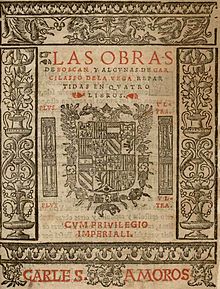Western literature
Western literature, also known as European literature,[1] is the literature written in the context of Western culture in the languages of Europe, and is shaped by the periods in which they were conceived, with each period containing prominent western authors, poets, and pieces of literature.
For the literary genre featuring stories set on the American frontier, see Western fiction.
The best of Western literature is considered to be the Western canon. The list of works in the Western canon varies according to the critic's opinions on Western culture and the relative importance of its defining characteristics. Different literary periods held great influence on the literature of Western and European countries, with movements and political changes impacting the prose and poetry of the period. The 16th Century is known for the creation of Renaissance literature,[2] while the 17th century was influenced by both Baroque and Jacobean forms.[3] The 18th century progressed into a period known as the Enlightenment Era for many western countries.[4] This period of military and political advancement influenced the style of literature created by French, Russian and Spanish literary figures.[4] The 19th century was known as the Romantic era, in which the style of writing was influenced by the political issues of the century, and differed from the previous classicist form.[5]
Western literature includes written works in many languages:
18th century[edit]
Enlightenment era[edit]
The Enlightenment era was a time of progression which spanned over the 18th century across many western countries.[19] Upon recent years, this time of "enlightenment" was split into two degrees of progression, both a "moderate" and "radical" form, and was observed to be less harmonious across regions in its nature than previously thought.[19]
Literature has been produced to comment on the different versions of "Enlightenment" that spawned across Europe during the 18th century. Henry Farnham stated in his book The Enlightenment in America that the "Moderate Enlightenment […] preaches balance, order and religious compromise", whereas the "Revolutionary Enlightenment" attempted to "construct a new heaven and earth out of the destruction of the old".[20]
